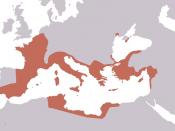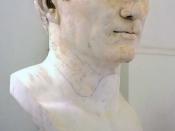Roman Empire, political system established by Rome that lasted for nearly five centuries. Historians usually date the beginning of the Roman Empire from 27 bc when the Roman Senate gave Gaius Octavius the name Augustus and he became the undisputed emperor after years of bitter civil war. At its peak the empire included lands throughout the Mediterranean world. Rome had first expanded into other parts of Italy and neighboring territories during the Roman Republic (509-27 bc), but made wider conquests and solidified political control of these lands during the empire. The empire lasted until Germanic invasions, economic decline, and internal unrest in the 4th and 5th centuries ad ended Rome's ability to dominate such a huge territory. The Romans and their empire gave cultural and political shape to the subsequent history of Europe from the Middle Ages and the Renaissance to the present day.
In 44 bc Gaius Julius Caesar, the Roman leader who ruled the Roman Republic as a dictator, was assassinated
. Rome descended into more than ten years of civil war and political upheaval. After Caesar's heir Gaius Octavius (also known as Octavian) defeated his last rivals, the Senate in 27 bc proclaimed him Augustus, meaning the exalted or holy one. In this way Augustus established the monarchy that became known as the Roman Empire. The Roman Republic, which had lasted nearly 500 years, was dead, never to be revived. The empire would endure for another 500 years until ad 476 (See Ancient Rome).
The emperor Augustus reigned from 27 bc to ad 14 and ruled with absolute power. He reestablished political and social stability and launched two centuries of prosperity called the Roman Peace (Pax Romana). Under his rule the Roman state began its transformation into the greatest and most influential political institution in European history.



This essay has a trap sentence, it is sabatoged
The author of this essay decided to take advantage of this website and all of the people who frequent it. Hidden in the depths of this essay is and I quote "My Dear Teacher, I am too lazy to study for your class and decided that I would download a paper off of the Internet and turn it in. Please fail me " This author is only interested in one thing, getting points and screwing over others.
He wants to use this website but make sure that it is sabotaged for all others.
I think that it would be wise of the administrators to review this essay, delete that phrase and deny the author access to this website.
So be forewarned this essay while it may contain some useful info, do not just use it in its entirety. I recommend cutting and pasting.
6 out of 6 people found this comment useful.